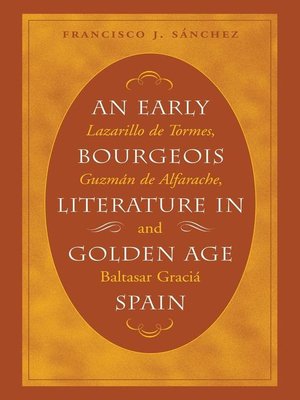An Early Bourgeois Literature in Golden Age Spain
ebook ∣ Lazarillo de Tormes, Guzmán de Alfarache and Baltasar Gracián · North Carolina Studies in the Romance Languages and Literatures
By Francisco J. Sánchez

Sign up to save your library
With an OverDrive account, you can save your favorite libraries for at-a-glance information about availability. Find out more about OverDrive accounts.
Find this title in Libby, the library reading app by OverDrive.



Search for a digital library with this title
Title found at these libraries:
| Library Name | Distance |
|---|---|
| Loading... |
Tracing the beginnings of a bourgeois literature in Golden Age Spain, Francisco Sánchez examines works by Baltasar Gracián (1601–1658), major picaresque texts — particularly Lazarillo de Tormes (1554) and Mateo Alemán's Guzmán de Alfarache (1599–1604) — and contemporary writings in which political economists and jurists look at new economic and political circumstances.
Using the term república to describe an economic sphere of social life under the constrictions of both the monarchy and the privileges of the seignorial system, Sánchez investigates notions of person, culture, and life in these texts. He also analyzes the formation of a private sphere of social action and the emergence of a literary sphere to represent early bourgeois values and sensibilities. Sánchez argues that this literature represents culture as intellectual and verbal skills for the social and economic advancement of a Christian but secularized person.
Using the term república to describe an economic sphere of social life under the constrictions of both the monarchy and the privileges of the seignorial system, Sánchez investigates notions of person, culture, and life in these texts. He also analyzes the formation of a private sphere of social action and the emergence of a literary sphere to represent early bourgeois values and sensibilities. Sánchez argues that this literature represents culture as intellectual and verbal skills for the social and economic advancement of a Christian but secularized person.







